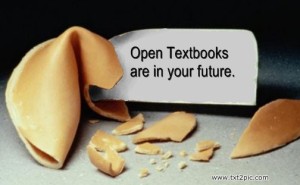Adding An "E" to Textbooks and Readers
Tomorrow, I will be attending an NJEDge.Net-EATF meeting that is an exploration of all things e-reader, e-book, e-textbook at Fairleigh Dickinson University in NJ. The release of the iPad has heated up the conversations about these formats generally and adds yet another possibility to what schools might be considering.
There will be reports from three eReader pilot projects at Fairleigh Dickinson, Princeton and Seton Hall Universities. Pearson Education will discuss eTextbooks and ePublishing formats. eBook purchasing will be addressed by VALE. I will talk about my own interest in all this which is Open Textbooks rather than the hardware used to use them.
Electronic textbooks (eTextbooks, eBooks) are digital versions of textbooks. The media varies widely from digital reproductions of print editions to versions that include embedded animations, video and interactive features. A good deal of interest in using e-textbooks comes from the reduced cost for students.
Most e-textbooks are currently distributed by commercial publishers and have DRM (digital rights management). They can be read via computer, some cell phones and using eReaders (like a Kindle or iPad) depending on the file format.
Open textbooks are quite different in spirit - though similar in formats and reading options. They are free, openly-licensed textbooks offered online by their author(s).
 The group that I have become involved with is the CCOTC (Community College Open Textbook Consortium) which reviews and collects available textbooks in order to encourage adoption.
The group that I have become involved with is the CCOTC (Community College Open Textbook Consortium) which reviews and collects available textbooks in order to encourage adoption.
I am collecting information on all these topics - Open Textbooks, "free" Textbooks (not the same thing), but also on evaluating textbooks and e-readers - on a new website. I'm also adding information on schools that are creating their own textbooks that may not be "open" or shared and may actually be created with the cooperation of textbook publishers.
There are also efforts that might be considered hybrids. For example, Flat World Knowledge has already released a dozen open textbooks that are used by more than 400 professors. Their business model is to offer the open textbook free online, and then sell ancillary products that students are likely to buy if prices are reasonable - print copies, study guides, PDF download, etc. Flat World Knowledge compensates its authors with royalties on these sales.
Most of you reading this will not be attending tomorrow's session, so I offer my brief introductory presentation below and recommend that you check my site on eTextbooks at pccc.libguides.com/etextbooks. I will be adding information and links there from tomorrow's session and from my own work over the next year.
Several of my open textbook presentations are available on slideshare.net/ronko4/.
I am also participating in the Community College Open Textbook Collaborative and the related Open Textbook Advocate Trainers group. It is my hope that we can get a New Jersey advocacy cohort group started for Open Textbooks. Several cities and states have started groups, so look for your region.
RELATED
Open Textbook Advocacy
College Bookstores Putting eTextbooks On Shelves
Visit Community College Open Textbook Project
Visit OpenTextbookAdvocateTrainers
Comments
No comments